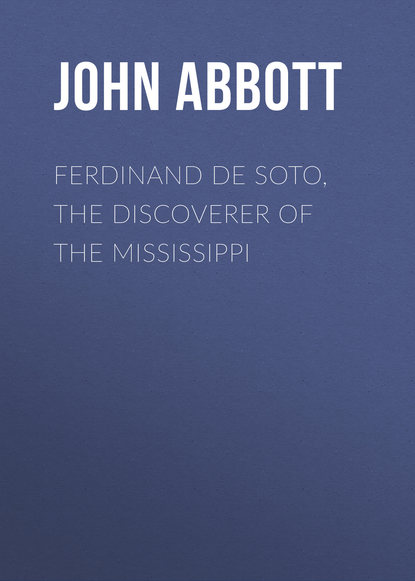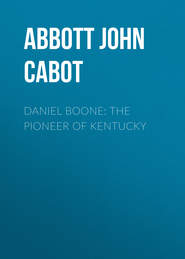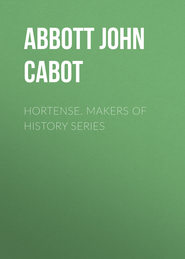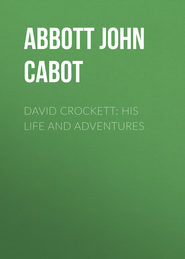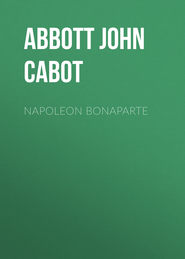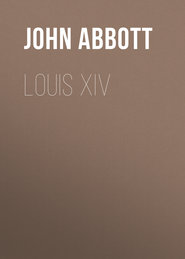По всем вопросам обращайтесь на: info@litportal.ru
(©) 2003-2024.
✖
Ferdinand De Soto, The Discoverer of the Mississippi
Настройки чтения
Размер шрифта
Высота строк
Поля
Soon after the departure of Gallegos, De Soto received the intelligence that the chief Ucita had taken refuge in a forest, surrounded with swamps, not far from the Spanish camp. The vainglorious Porcallo was exceedingly indignant that the Indian chief should presume to hold himself aloof from all friendly advances. He entreated De Soto to grant him the privilege of capturing the fugitive. De Soto complied with his request. The impetuous old man, fond of parade, and lavish of his wealth, selected a band of horsemen and footmen, all of whom were gorgeously apparelled for the occasion. He, himself, was mounted on a magnificent steed and cased in glittering armor.
It seems that the noble Ucita kept himself well informed of every movement of the invaders. With a spirit of magnanimity which would have done honor to the best Christian in the Spanish ranks, he sent a courier to meet Porcallo, and to say to him,
"You will only expose yourself to infinite peril from the rivers, morasses, and forests through which you will have to pass in your attempt to reach my retreat. My position is so secure that all your attempts to take me will result only in your own loss. I do not send you this message from any fears on my own account, but because your leader, De Soto, has manifested so much forbearance in not injuring my territory or my subjects."
It is really refreshing to find here and there, among all these demoniac deeds of demoniac men, some remaining traces of that nobility of character which man had before the fall, when created in God's image he was but little lower than the angels. Man, as we see him developed in history, is indeed a ruin, but the ruin of a once noble fabric. When we think of what man might be, in all generous affections, and then think of what man is, it is enough to cause one to weep tears of blood.
Porcallo could not appreciate the magnanimity of Ucita. He regarded the message as one of the stratagems of war, dictated either by fear or cowardice. He therefore ordered the trumpets to sound the advance, his only fear being, that the chief might escape. Porcallo, a Quixotic knight, had no element of timidity in his character. He led his troops. He never said "Go," but "Follow." Pressing rapidly forward, the little band soon arrived upon the border of a vast and dismal morass, utterly pathless, stretching out many leagues in extent.
The hot-headed cavalier, thinking that the swamp might be waded, put spurs to his horse and dashed forward. He had advanced but a few rods when the horse, struggling knee-deep through the mire, stumbled and fell. One of the legs of the rider was so caught beneath the animal as to pin him inextricably in the morass, covering him with water and with mud. The weight of his armor sank him deeper in the mire, and in the desperate struggles of the steed for extrication, he was in great danger of being suffocated. None could come to his aid without danger of being swallowed up in the bog.
The unfeeling and brutal soldiers stood upon the borders of the morass with shouts of merriment, as they witnessed the sudden discomfiture of their leader; a discomfiture the more ludicrous, in contrast with his gorgeous attire, and his invariably proud and lofty bearing. At length Porcallo extricated himself, and, drenched with water, and covered with mud, led his equally bemired steed to the land. He was humiliated and enraged. The derision of the soldiers stung him to the quick. He had embarked in the expedition to gain glory and slaves. He had encountered disgrace; and the prospect of kidnapping the natives, under such a leader as De Soto had proved himself to be, was very small.
It is probable that before this disaster he had seriously contemplated abandoning the expedition and returning to his princely mansion in Trinidad. Ordering his men to face about, he sullenly and silently returned to the Spanish camp. Throwing up his commission with disgust, he embarked for Cuba, and we hear of him no more.
"His train of servants," writes Mr. Theodore Irving, "Spanish, Indian and negro, were embarked with all speed. But when the gallant old cavalier came to take leave of his young companions in arms, and the soldiers he had lately aspired to lead so vain-gloriously, his magnificent spirit broke forth. He made gifts to the right and left, dividing among the officers and knights all the arms, accoutrements, horses and camp equipage, with which he had come so lavishly and so ostentatiously provided, and gave, for the use of the army, all the ample store of provisions and munitions brought for the use of himself and his retinue. This done, he bade farewell to campaigning and set sail for Cuba, much to the regret of the army, who lamented that so gallant a spirit should have burned out so soon."[2 - Conquest of Florida, by Theodore Irving, p. 81.]
Indeed, it is stated in what is called "The Portuguese Narrative" of these events, that Porcallo and De Soto had already quarrelled so decisively that they were no longer on speaking terms. Porcallo, thoroughly destitute of moral principle, was a slave hunter; a character whom De Soto thoroughly despised, and whose operations he would not on any account allow to be carried on in his army. Porcallo therefore found no difficulty in obtaining permission to retire from the service. Probably both the governor and his lieutenant were equally happy to be rid of each other.
CHAPTER X
The March to Ochile
The March Commenced. – The Swamps of Florida. – Passage of the Morass. – Heroism of Sylvestre. – Message to Acuera. – His Heroic Reply. – Fierce Hostility of the Indians. – Enter the Town of Ocali. – Strange Incident. – Death of the Bloodhound. – Historical Discrepancies. – Romantic Entrance to Ochile.
The day after the departure of Porcallo, a courier from Captain Gallegos, accompanied by a small guard, came to the Spanish camp at Ucita. He informed De Soto that there was an ample supply of provisions at Uribaracaxi to sustain the army for several days; and that he had received information that at not a great distance from that place large quantities of gold could be obtained. De Soto and his companions were greatly elated by these tidings, trusting that they were about to enter upon another Peru. A garrison of forty horsemen and eighty foot soldiers, was left at Ucita, to protect the military and commissariat stores collected there, and to guard the three vessels still remaining in the bay. Captain Calderon, who was left in command, was strictly enjoined to treat the Indians with the utmost kindness, and not to make war upon them, even if provoked by taunts and insults.
De Soto, then, with the main body of his army, set out on the march for Uribaracaxi. It was soon very evident to him that he was not in Peru. There was no smoothly-paved highway for his soldiers to traverse. The country was pathless, rough, apparently uninhabited, encumbered with tangled forests, and vast dismal swamps. It was a very arduous enterprise for soldiers burdened with heavy armor to force their way through such a wilderness, with the baggage essential to such a body of men.
One of the great objects of the governor, and a humane one, was to establish a colony in Florida. A herd of three hundred swine was kept in the line of march, as these animals were deemed the most advantageous stock for new settlers. After a toilsome march of two days they reached the native village of Mucozo, where the friendly chief of the same name resided. It is said that this place is now called Hichipuchsassa. The chief received them with great hospitality.
Pressing on without delay, they soon reached Uribaracaxi, which town it is supposed was situated near the head of the Hillsborough river, which stream empties into Tampa Bay. The chief was still absent, in his place of refuge, amidst the fastnesses of the forest. All of De Soto's friendly endeavors to draw him from his retreat proved unavailing. The Spaniards were yet to traverse many leagues of this unknown country before they could enter the region where it was supposed the gold could be found.
Florida is emphatically a region of swamps. There is probably no section of our country which, in a state of nature, would be more difficult for the passage of an army. About nine miles from the village, directly on their line of march, extending far away to the east and the west, there was a vast bog three miles wide. It was a chaotic region of mud and water, with gigantic trees and entangling roots. After long search a passage was found through which, by the toilsome efforts of a whole day, the army forced its way. Beyond the swamp there opened before them a smooth, luxuriant flower-enamelled prairie. Rejoicingly the army pressed forward over this beautiful expanse, when suddenly they found their steps again arrested by a series of sluggish streams, stagnant bayous, and impenetrable bogs.
De Soto now took a hundred horse and a hundred foot soldiers, and leaving the remainder of the army safely encamped, set out to explore the country in search of a practicable route of travel. For three days he skirted the region of bogs, lakes and thickets, sending out his runners in different directions to find some outlet. But there was no outlet for the journeyings of civilized men. They captured some Indians, who offered to guide them, but who treacherously led them to more difficult passes and into ambushes where many of their horses were slain. The dreadful punishment of these false guides was to be torn to pieces by bloodhounds. They bore their sufferings with amazing fortitude.
At length they found a very rude, difficult and dangerous path by which the Indians crossed these swamps. At one point, where the water could not be forded for a distance of nearly three hundred feet, the Indians had constructed a bridge by cutting down two large trees and uniting the space that still remained between them in this Stygian lake, by tying logs together, with cross-poles for flooring. To add to the embarrassments of the Spaniards, apparently innumerable small bands of Indians were hovering on their track, assailing them with their sharp-pointed arrows, wherever they could get a shot, and then escaping into the impenetrable region around. They were very careful never to come to an open conflict. Canoes, propelled by the paddle, would often dart out from the thickets, a shower of arrows be discharged, and the canoes disappear where no foot could follow them.
A very bold courier, on one of the fleetest horses, was sent back to summon the main body of the army to march, under the command of Moscoso, and join the party of explorers which De Soto had led. This young man, by the name of Sylvestre, accomplished his feat through a thousand perils and hair-breadth escapes.
Three days De Soto's band had passed struggling through bog and brake, bramble and forest. Sylvestre was to find his path back travelling with all possible speed by night as well as by day. One attendant only was with him, Juan Lopez. They never could have found their path but through the sagacity of their horses. These noble animals seemed to be endowed for the time with the instinct of setter dogs. For in the darkness of the night they would puff and snort, with their noses close to the ground, ever, under the most difficult circumstances, finding the track. The distance over which they urged their horses exceeded thirty miles. For three days the poor creatures had not been unsaddled, and the bits had but occasionally been removed from their mouths that they might enjoy the brief refreshment of grazing.
"At times," writes Mr. Irving, "they passed within sight of huge fires, around which the savages were stretched in wild fantastic groups, or capering and singing, and making the forests ring with yells and howlings. These were probably celebrating their feasts with war-dances. The deafening din they raised was the safeguard of the two Spaniards, as it prevented the savages noticing the clamorous barking of their dogs, and hearing the tramping of the horses as they passed."[3 - Conquest of Florida, p. 89.]
Immediately on the arrival of these two bold troopers, Moscoso dispatched supplies for the governor with an escort of thirty horsemen. In the mean time the troops under De Soto were nearly perishing with hunger. They were compelled to leave their encampment in search of food. Fortunately, at no great distance, they found a beautiful valley, waving luxuriantly with fields of corn or maize. Here they encamped and here were soon joined by the escort and their welcome supplies. In a few days Moscoso came also with the residue of the army. They were about sixty miles north of Uribaracaxi. It is supposed the place is now known by the old Indian name of Palaklikaha.
The chief, whose name was Acuera, and all his people had fled to the woods. De Soto sent Indian interpreters to him with friendly messages and the declaration that the Spaniards had no desire to do him any injury; but that it was their power, if the Indians resisted, to punish them with great severity. He also commissioned them to make the declaration, which to him undoubtedly seemed perfectly just and reasonable, but which, to our more enlightened minds, seems atrocious in the extreme, that it was their only object to bring him and his people into obedience to their lawful sovereign, the king of Spain. With this end in view, he invited the chief to a friendly interview. It can hardly be doubted that in that benighted age De Soto felt that he was acting the part of a just and humane man, and of a Christian, in extending the Christian reign of Spain over the heathen realms of Florida. Acuera returned the heroic reply:
"Others of your accursed race have, in years past, poisoned our peaceful shores. They have taught me what you are. What is your employment? To wander about like vagabonds from land to land; to rob the poor; to betray the confiding; to murder in cold blood the defenceless. With such a people I want no peace – no friendship. War, never-ending, exterminating war, is all the boon I ask. You boast yourself valiant; and so you may be, but my faithful warriors are not less brave; and this, too, you shall one day prove, for I have sworn to maintain an unsparing conflict while one white man remains in my borders; not openly, in battle, though even thus we fear not to meet you, but by stratagem, and ambush, and midnight surprisals. I am king in my own land, and will never become the vassal of a mortal like myself. As for me and my people, we choose death, yes a hundred deaths, before the loss of our liberty and the subjugation of our country."
This answer certainly indicates a degree of intelligence and mental culture far above what we should expect to find in the chief of a tribe of Florida Indians. The chivalric spirit of De Soto compelled him to admire the heroism it displayed. He consequently redoubled his efforts to gain the friendship of the chief, but all in vain. For twenty days De Soto remained in this encampment, recruiting his troops and making arrangements for a farther advance. The Indians made constant warfare upon him, lurking in the thickets which densely surrounded his camp. No Spaniard could wander one hundred steps without danger of being shot down by an invisible foe, whose deadly arrow was more noiseless in its flight than the sighing of the breeze through the tree tops. In this way, during these twenty days, fourteen Spaniards were killed and many more wounded. Fifty Indians also fell struck by the bullets of the invaders. De Soto allowed himself only in a war of self-defence. He strictly prohibited his followers from doing any injury to the villages or the property of the natives, or of engaging in the slightest act of violence towards any who were not in active hostility against them.
After twenty days of such repose as could be found in this war harassed camp, De Soto resumed his march. He directed the steps of his army in a northeasterly direction towards a town called Ocali, about sixty miles from their encampment. It seems that in most, if not all of this region, the chief and his principal town bore the same name.
The path of the army led just over a dreary expanse of desert sands, about thirty miles broad. There was no underbrush, and over the smooth surface both men and horses could travel with the greatest ease. They then entered upon a beautiful region of fertility and luxuriance. Fields of corn waved their graceful leaves and bannered heads in the breeze. Farm houses and pleasant villages were scattered around, indicating that peace, with its nameless blessings, reigned there. They reached the central town, Ocali, and found it to consist of six hundred substantially built houses. This would give the place a population of probably not less than three thousand.
But the chief, Ocali, and his principal inhabitants, with their effects, had fled to the forests. The Spanish army immediately took up its quarters in the dwellings of Ocali. They found here an ample supply of provisions, which they seem without any questionings to have appropriated to their own use. The clime was balmy, the region beautiful, the houses commodious, the food abundant, and the few Indians who remained behind manifested no hostility. The common soldiers, following the example of their leader, treated all with great kindness.
De Soto sent several Indian messengers daily to the retreat of the chief with proffers of peace and friendship. Though Ocali rejected all these overtures, it seems that they must have made an impression on the minds of some of his followers.
One day, four young Floridian warriors, gorgeously dressed and with nodding plumes, came to the Spanish camp. De Soto received them with great cordiality and invited them to a handsome collation with his principal officers. Mr. Irving, in his well authenticated narrative, gives the following account of the scene which there ensued:
"They sat down and appeared to be eating quietly, when perceiving the Spaniards to be off their guard, they rose suddenly and rushed full speed to the woods. It was in vain for the Spaniards to pursue them on foot, and there was no horse at hand. A hound of uncommon sagacity, however, hearing the cry of the Indians, and seeing them run, pursued them. Overtaking and passing by the first and second and third, he sprang upon the shoulders of the foremost and pulled him to the ground; as the next Indian passed on, the dog, leaving the one already down, sprang upon his successor and secured him in the same way. In like manner he served the third and fourth, and then kept running from one to the other, pulling them down as fast as they rose, and barking so furiously that the Indians were terrified and confounded and the Spaniards were enabled to overtake and capture them. They were taken back to the camp and examined separately. For as they were armed, the Spaniards apprehended some treachery; but it appeared that their sudden flight was only by way of exploit, to show their address and fleetness."[4 - Irving's Conquest of Florida, p. 100.]
Ocali, after resisting for six days all friendly advances, was at length induced to visit the Spanish camp. He was received by De Soto with the greatest kindness, and every effort was made to win his confidence. There was a deep and wide river near the village which it was necessary for the Spaniards to cross in their advance. De Soto, accompanied by Ocali and several of his subjects, was walking on the banks of this stream to select a spot for crossing, by means of a bridge or raft, when a large number of Indians sprang up from the bushes on the opposite side, and assailing them with insulting and reproachful language, discharged a volley of arrows upon them, by which one of the Spaniards was wounded.
Upon De Soto's demanding of the chief the meaning of this hostile movement, Ocali replied, that they were a collection of his mutinous subjects, who had renounced their allegiance to him, in consequence of his friendship for the Spaniards. The bloodhound, to which we have alluded, that had so sagaciously captured the four Floridians, was in the company held in a leash by one of the servants of the governor. The moment the ferocious animal heard the yells of the Indians, and witnessed their hostile actions, by a desperate struggle he broke from his keeper and plunged into the river. In vain the Spaniards endeavored to call him back. The Indians eagerly watched his approach, and as he drew near they showered upon him such a volley of arrows, that more than fifty pierced his head and shoulders. He barely reached the land, when he fell dead. The army mourned the loss of the sagacious, fearless and merciless brute as if he had been one of the most valiant of their warriors.
It soon became evident that Ocali had but slight influence over his tribe. De Soto, apprehensive that it might be thought that he detained him against his will, advised him to return to his people, assuring him that he would always be a welcome guest in the Spanish camp. He left, and they saw him no more.
Crossing the river by a rude bridge constructed by the Spanish engineers, De Soto took the lead with a hundred horse and a hundred foot. After a monotonous march of three days over a flat country, they came to a very extensive province called Vitachuco, which was governed in common by three brothers. The principal village, Ochile, was rather a fortress than a village, consisting of fifty large buildings strongly constructed of timber. It was a frontier military post; for it seems that this powerful tribe was continually embroiled in war with the adjacent provinces. Mr. Williams, in his History of Florida, locates Ochile just south of what is called the Allachua prairie.
There are two sources of information upon which we are dependent for most of the facts here recorded. One is, the "History of Hernando De Soto," written by the Inca Garcilaso de la Vega. He was the son of a Spanish nobleman and of a Peruvian lady of illustrious rank. His narrative was written as related to him, by a friend who was one of the expedition. With some probable exaggerations it is generally deemed authentic. Mr. Southey describes the work as one of the most delightful in the Spanish language.
The other is what is called "The Portuguese Narrative." It is from the pen of an anonymous writer, who declares himself to have been a Spanish cavalier, and that he describes the scenes of which he was an eye-witness. Though these two accounts generally harmonize, there is at times very considerable discrepancy between their statements. In the extraordinary events now to be chronicled, the writer has generally endeavored to give the narrative, as has seemed to him most probable, in comparing the two accounts, with the well-established character of De Soto.
The advance guard of the Spanish army marched all night, and just before the dawn of the morning, entered the silent streets of Ochile. Wishing to produce as deep an impression as possible upon the minds of the Indians, their drums were beat, and their trumpets emitted their loudest blasts, as one hundred horsemen with clattering hoofs, and one hundred footmen with resounding arms, startled the citizens from their repose. To these simple natives, it must have been a scene almost as astounding as if a legion of adventurers, from the star Sirius, were at midnight to make their appearance in the streets of a European city.
The house of the chief was centrally situated. It was a large mansion, nearly three hundred feet in length by one hundred and twenty in width. There were also connected with it quite a number of outbuildings of very considerable dimensions.
As a matter of course, immediately the whole population was in the streets in a state of utter amazement. It was the object of De Soto to appear in such strength, and to take such commanding positions, as would prevent any assault on the part of the Indians, which would lead to bloodshed. He was well informed of the warlike reputation of the chief who resided there; and knew that in that fortress he was surrounded by a numerous band of warriors, ever armed and always ready for battle. The region around was densely populated. Should the chief escape, determined upon hostility, and rally his troops around him, it might lead to sanguinary scenes, greatly to be deplored.
De Soto immediately held an interview with the chief; treated him with the utmost kindness and assured him that he had no intention of inflicting any injury upon him or any of his subjects; that he sought only for permission to pass peaceably and unmolested through his realms. The soldiers were strictly enjoined to treat the natives in the most friendly manner, and not to allow themselves, by any provocation whatever, to be drawn into a conflict.
The chief was very narrowly watched, that he might not escape. Still he was unconscious of his captivity, for he was held by invisible chains.
During the following day the main body of the army entered Ochile with all the pomp which prancing horses richly accoutred, gorgeous uniforms, bugle-blasts, waving banners, and glittering armor could present. Ocile, its chief, and his warriors were at the mercy of the Spaniards. But they had come not as conquerors, but as peaceful travellers, with smiles and presents, and kindly words. Still the power of these uninvited guests was very manifest, and it was very evident that any hostility on the part of the natives would bring down upon them swift destruction.
It so happened, that the youngest of the three brother chiefs resided at Ochile. At the suggestion of De Soto, he sent couriers to his two brothers, informing them of the arrival of the Spaniards, of their friendly disposition, and of their desire simply to pass through the country unmolested. At the same time he stated, by request of De Soto, that the strength of the Spaniards was such that they were abundantly able to defend themselves; and that should any attack be made upon them, it would lead to results which all would have occasion to deplore.
The capital of the second brother was not far distant. In three days he came to Ochile, decorated in gorgeous robes of state and accompanied by a retinue of his warriors, in their most showy costume. It is recorded that he had the bearing of an accomplished gentleman, and seemed as much at ease amidst the wondrous surroundings of the Spanish camp, as if he had been accustomed to them all his days. He entered into the most friendly relations with De Soto and his distinguished officers, and seemed very cordially to reciprocate all their courteous attentions.
CHAPTER XI
The Conspiracy and its Consequences
The Three Brother Chieftains. – Reply of Vitachuco to his Brothers. – Feigned Friendship for the Spaniards. – The Conspiracy. – Its Consummation and Results. – Clemency of De Soto. – The Second Conspiracy. – Slaughter of the Indians. – March of the Spaniards for Osachile. – Battle in the Morass.





